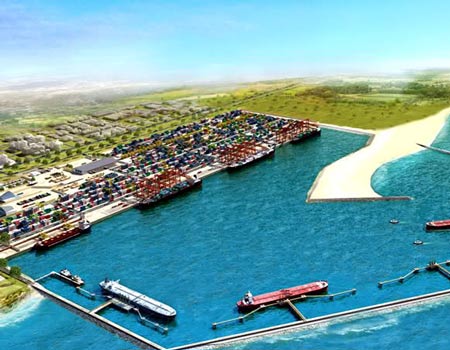Some of the factors expected to be properly shaped for efficient delivery by the seaport include a well-articulated road and rail network, and utilisation of inland waterways for efficient evacuation of cargoes that would be imported through the facility.
Experts, who spoke on the imperatives of deep seaports in Nigeria (A case study of Lekki Deep Seaport) during a training programme for journalists in Lagos, described the $1.5 billion project as a noble idea which would significantly boost the economy of the country.
ALSO READ: Call Onochie to order, CAN tells Buhari
A maritime expert and professor at the Lagos Business School, Frank Ojadi, said a deep seaport is essential because good nautical access is essential for maritime connectivity of ports. According to Ojadi, “Over the last decades, ships have rapidly become bigger and deeper. For example, the draft of the largest container ships at this moment is approximately 14.5 metres, which is deeper than what most ports can accommodate.
“Port depth thus becomes a competitive advantage for attracting the largest ships and a challenge for many ports that are estuary and have no direct deep sea access.”
Ojadi noted that deep seaports would create opportunities for transshipment operations, generate more employment, promote local shipping business and boost trade in the country.
The don, however, urged the Federal and state governments to begin to think of good road and rail networks, as well as inland navigation to Lekki, considering the huge traffic that would be created by the deep seaport and Dangote Refinery, among the other major projects cited in that area.
He expressed worries that the Senate Committee on Ports Harbours and Waterways and the Nigerian Shippers’ Council have earlier identified this issue, but nothing concrete has been done.
Also speaking on the economic prospects of deep sea ports in the country, industry expert and Chief Executive Officer, Ships and Ports Communications, Mr. Bolaji Akinola, said the multi-billion dollar projects cited in the Lekki Free Zone corridor may face access challenges if plans for road and rail infrastructure to evacuate products from the refinery and seaport were not immediately begun.
In his words, “the record year for containers in Nigeria was 2014, with throughput of 1.6 million TEUs. That has been the highest so far in the history of this country. Since then we have had a plunge, but I see this year matching 2014 records.
“The records are already there because the throughput in first quarter 2018 is as good as what was recorded in the same period of 2014, which means that our economy is rebounding.”





